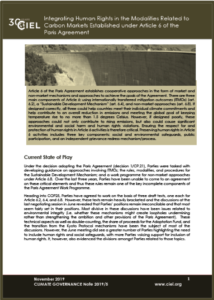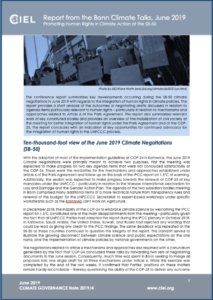Report from the Madrid Climate Conference / COP-25: Promoting Human Rights in Climate Action at the COP-25 (January 2020) – 6 pagesThis report from the 2020 UN Climate Conference (COP-25 in Madrid) provides a short overview of the climate talks with a focus on agenda items most relevant to the protection and promotion of human rights in climate action.
The report addresses briefly the following issues: climate ambition, regulation of international carbon trading, loss and damage, gender, traditional knowledge, and indigenous peoples, climate finance, adaptation, response measures, capacity building, and agriculture. Additionally, the report identifies key opportunities to promote rights-based climate action in 2020 as well as relevant calls for submissions by parties and stakeholders. Read the report.
|
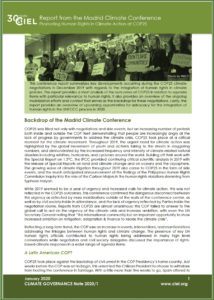 |
Promoting Public Participation in Climate Policies: Key Entry Points at the COP-25 and Beyond (December 2019) – 4 pagesThe mobilization of civil society during the past 15 months—building on the leadership of youth and children—provided unprecedented momentum for higher ambition and more inclusive and socially just policies. This movement confirmed the statement of the IPCC that noted in its 1.5ºC Special Report that “civil society is to a great extent the only reliable motor for driving institutions to change at the pace required.”
Through their ratification of the Aarhus Convention or their adoption (and, for some, early ratification) of the Escazú Agreement, 71 UNFCCC parties across Europe, Central Asia, Latin America, and the Caribbean have committed to promoting the right of the public to access to information, public participation, and access to justice in policies related to the environment. The Paris Agreement implementation at the national level offers a unique opportunity for these parties to uphold these principles across all climate policies. This briefing note provides an update on recent developments related to the Aarhus Convention and the Escazú Agreement, as well as identifies specific entry points to strengthen access to information, public participation, and access to justice at the COP-25 and beyond. Read the briefing note.
|
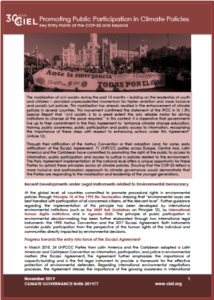 |
Learning the Lessons from Chile’s Alto Maipo Hydroelectric Project (December 2019) – 2 pagesThe lack of even the most basic social safeguards for the Kyoto Protocol’s carbon trading mechanism led to projects that have violated the rights of local communities—such as Chile’s Alto Maipo Project—being touted as “clean development” projects. With the rules for the Article 6 mechanisms of the Paris Agreement under negotiation at COP25, it is imperative that the Parties learn the lessons from past CDM projects such as Alto Maipo in order to avoid repeating the mistakes made under Kyoto. Read the briefing note. |
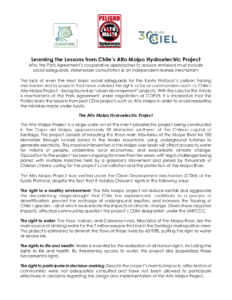 |
COP-25 Briefing Note: Integrating Human Rights in Climate Action (November 2019) – 6 pagesDecades of insufficient climate action has led to an increase in greenhouse gas concentrations, which has resulted in what has been described as an unprecedented threat for human rights. Nevertheless, human rights are often ignored in climate responses, leading to ineffective policies and further harm to those impacted, particularly for local communities and indigenous peoples. Governments must take urgent action to effectively mitigate climate change and place human rights at the core of their climate policies to uphold their existing human rights obligations. This briefing note explores opportunities arising from the agenda of the conference for the UNFCCC Parties to promote human rights at COP-25. Read the briefing note.
|
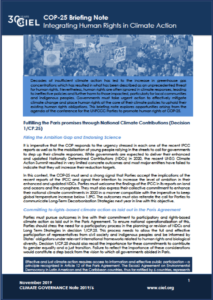 |
Integrating Human Rights in the Modalities Related to Carbon Markets Established Under Article 6 of the Paris Agreement (November 2019) – 4 pagesArticle 6 of the Paris Agreement establishes cooperative approaches in the form of market and non-market mechanisms and approaches to achieve the goals of the Agreement. There are three main components of Article 6: using internationally transferred mitigation outcomes (art. 6.2), a “Sustainable Development Mechanism” (art. 6.4), and non-market approaches (art. 6.8). If designed correctly, all three could help countries meet their individual climate commitments and help contribute to an overall reduction in emissions and meeting the global goal of keeping temperature rise to no more than 1.5 degrees Celsius. However, if designed poorly, these approaches could not only contribute to rising emissions, but also cause significant environmental and social harm and human rights violations. Ensuring the respect for and protection of human rights in Article 6 activities is therefore critical. This briefing note addresses lessons learned under the Kyoto Protocol and how to ensure that Paris Mechanisms do not infringe human rights, elaborating on three key components: social and environmental safeguards, public participation, and an independent grievance redress mechanism/process. Read the briefing note. |
|
Report from the Bonn Climate Talks / SB-50: Promoting Human Rights in Climate Action at the SB-50 (July 2019) – 6 pagesThis report from the June 2019 climate negotiations in Bonn sought to provide a short 10,000-foot assessment of the climate talks, complemented by a more detailed description of outcomes related to key agenda items that are more particularly relevant from the perspective of human rights and the mapping of upcoming submissions opportunities. The report addresses briefly the following issues: access to information and public participation, social safeguards in the context of carbon trading mechanisms under the Paris Agreement, Loss and Damage, Agriculture, and Gender. Relevant developments related to the work of the following bodies is also briefly in the Local Communities and Indigenous Peoples Platform, the Paris Committee on Capacity Building and the Katowice Committee of Experts on the Impacts of the Implementation of Response Measures. Read the report. |
|
Promoting Public Participation in Climate Policies: Key Entry Points in the Agendas of the SBI-50 and SBSTA-50 (June 2019) – 4 pagesThis briefing note offers an overview of opportunities to promote public participation and access to information in climate policies, identifying proposals related to specific agenda items to be addressed by the SBI and the SBSTA during the June 2019 climate talks. The note also provides a short overview of the legal obligations related to participatory climate governance as provided under regional legal instruments in Europe and Central Asia (the Aarhus Convention) and in Latin America and the Caribbean (the Escazu Agreement). A short mapping of key references to access to information and public participation across decisions adopted at the COP-24 is also provided. Read the briefing note. |
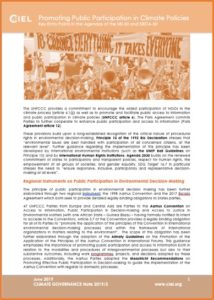 |
References to Human Rights under the UN Climate Agreements (February 2019) – 2 pagesThis briefing note provides a compilation of key references to human rights in decisions adopted by the Parties to the UNFCCC and to the Paris Agreement. It highlights the fact that Parties are explicitly recognizing the relevance of human rights in an increasing number of work areas under the Convention, including capacity building, gender, indigenous peoples and local communities knowledge, and loss and damage. This compilation is complemented by a short assessment of references made to human rights in the work of constituted bodies established under the UNFCCC. Finally, we offer a short overview of how Parties have referred to human rights in their climate commitments and implementation reports. Read the briefing note. |
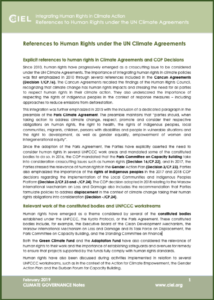 |
Reviewing the Compatibility of States’ Climate Policies with their Obligations under the ICESCR (February 2019) – 12 pagesUnder the International Covenant on Economic Social and Cultural Rights, 169 States have the legal obligation to take steps, individually and through international assistance and co-operation, to the maximum of their available resources, with a view to achieving progressively the full realization of the rights provided under the Covenant. In the context of climate change, this obligation requires that States take urgent steps to protect economic, social and cultural rights from climate harm, through mitigation, adaptation and climate finance measures. This briefing note seeks to define the obligations of States under the Covenant (and relevant international climate agreements that might inform the implementation of the Covenant) with respect to climate change and to identify independent information that can support any assessment regarding States’ compliance with those obligations, in the context of climate change. The note thus provides weblinks to country-specific information and assessments describing the climate commitments made by individual States, their adequacy in the light of science and equity, and the performance of governments towards meeting these objectives. This note was prepared jointly with the Global Initiative on Economic, Social and Cultural Rights (GI-ESCR). Read the briefing note. |
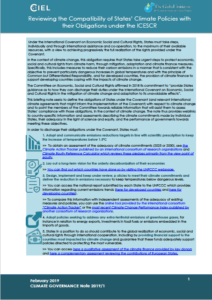 |

